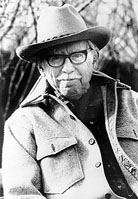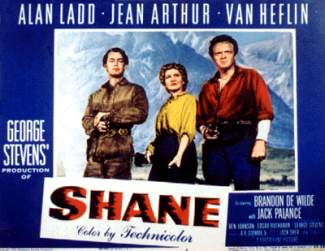"He rode into our valley in the summer of '89. I was a kid then, barely topping the backboard of father's old chuck-wagon. . . . In that clear Wyoming air I could see him plainly, though he was still several miles away. There seemed nothing remarkable about him, just another stray horseman riding up the road toward the cluster of frame buildings that was our town. Then I saw a pair of cowhands, loping past him, stop and stare after him with a curious intentness."
(from the opening lines of the 1949 novel Shane,
quoted in the essay Jack Schaefer, Teller of Tales by Louis Torres)
 from Lakewood Lore |
 |